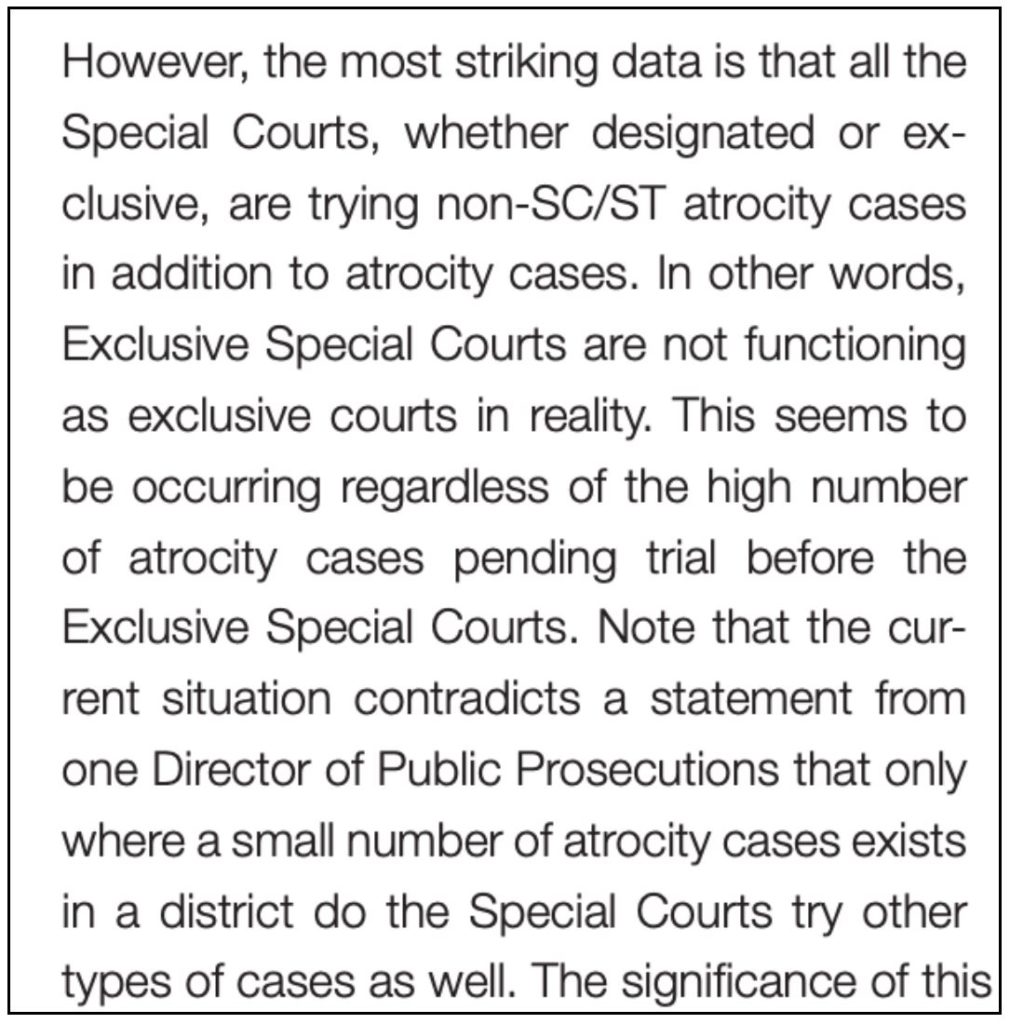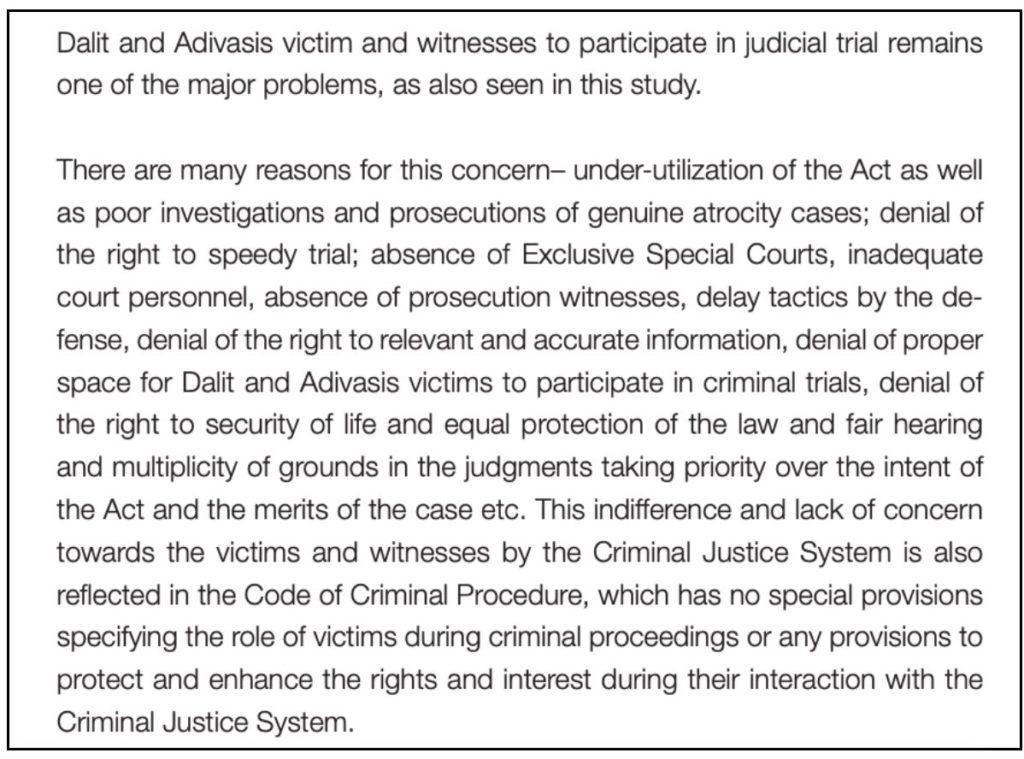Data from the NCRB indicates that more than 90% of the ‘Crimes Against SCs’ are pending in courts. In fact, the court disposal rate of these cases has decreased from around 12% in 2015 to just 6% in 2019. Even the conviction rate of 32% is significantly less than the conviction rate of overall IPC crimes.
In an earlier story, we analysed the trends related to reporting of Crimes/atrocities against the Scheduled Castes (SCs) in India. The trends indicate a 19% increase in the number of crimes reported in the 5-year period between 2015 & 2019. However, few study reports highlight the issues with under reporting as well as the quality of reporting of these crimes.
In this story, we look at the disposal of these reported cases by the police and in the courts, which would provide a better perspective on the state of justice to the marginalized communities. The data provided in NCRB’s Crime in India reports have been considered for this analysis.
Pendency Rate of the cases with Police decreased ever so slightly
In the earlier story, we had observed that there is an increase in the number of new cases being registered involving crimes against SCs. This has led to an increase in the number of new cases being investigated by the police & courts every year.
In 2015, around 52 thousand cases were investigated by the police which increased to 62 cases in 2019 i.e. an increase by 19%, similar to the increase to the number of new cases.
The pendency rate of cases with the police has come down, although there is an increase in the actual number of pending cases. In 2015, 29.7% of the cases that were being investigated by the police were pending, which fell to 28.7% by the end of 2019. This is because of the slight increase in the disposal rate of the cases being handled by the police.
In 2019, around 15% of the cases were closed by the police by filing a final report. Meanwhile, police filed a charge sheet in 56% of the cases. This is higher than the charge sheeting rate of the all IPC crimes in 2019 i.e. 47.5%.
Police filed a final report without a ‘Charge Sheet’ in 22% of the crimes categorized as ‘Other IPC Crimes’
The pendency rate (at the police) of crimes against SCs was around 25% by the end of 2019 for most of the major crime heads. In 2019, out of the 4,420 rape cases against SCs investigated by the police, 25% are still pending by the end of the year. Even in the case of ‘Assault on Women’, around a quarter of the cases are pending investigation by the end of the year.
While in the case of Rapes, around 9% of the cases were closed by the Police without a charge sheet, it is higher in cases of ‘Assault on Women’ where around 13% were closed without a charge sheet.
Higher Pendency rate are also observed among cases relating to Riots and Murder. ‘Simple Hurt’, which is the category with highest number of Crimes reported against SCs, has a lower rate of Charge sheeting with only 57%.
In the ambiguous category ‘Other IPC Crimes’ under which the second highest number of crimes against SCs were reported, about 22% the cases were closed by police without a charge sheet, raising more doubts about the nature of this categorization.
Court disposal rate of Crimes against SCs down to 6.1% in 2019
By the end of 2019, the pendency rate of all Cognizable IPC crimes is around 89% in courts, whereas it is 94% in the case of crimes against SCs. In fact, the pendency rate of these crimes has increased over the years. In 2015, the pendency rate was around 87%. The increase in the pendency rate has come at the cost of decrease in the disposal rate of courts. In 2015, around 12% of the pending cases were disposed by the courts, which nearly halved over the five-year period with the disposal rate in 2019 being only 6.1%.
While the disposal rate has reduced to almost half, the conviction rate among the disposed cases has increased slightly from around 27.6% in 2015 to around 32% in 2019. However, this is still much lower than the overall IPC conviction rate of around 50%.
Higher Conviction rate in the case of ‘Rape’ & ‘Murder’
Among the crimes against SCs, the convictions in the case of ‘Riots’ were only 0.79% of the total cases up for trial in 2019. On the other hand, the acquittal rate is seven times the conviction in the case of ‘riots’. Among the various categories of crimes against SCs, the conviction rate (over 40%) was high in the case of ‘rape’ & ‘murder’. One common theme across various crime heads is that the pendency rate in courts by the end of 2019 is over 90%.
Procedural lapses, investigation issues, and burden on special courts increasing pendency
Data (as per NRCB reports) and various other study reports indicate the challenges faced by the marginal communities in getting justice for the crimes committed against them. In an assessment of implementation of SC/ST PoA (Prevention of Atrocities) Act, in its 2016 Annual Report, the Ministry of Social Justice highlighted some of the problems with the implementation of the act. It notes the negligence on behalf of public servants in discharging of their duties (registration of complaints, recording statements, investigation etc.)

All these problems impact the trial of the cases in the courts, as observed by the low disposal rate & high acquittal rate compared to all IPC related crimes. This is corroborated by a study in 2014 by the National Campaign on Dalits Human Rights (NCDHR) on cases in five courts in Rajasthan, Andhra Pradesh, Tamil Nadu, Jharkhand & Uttar Pradesh. The study observed procedural lapses (delays in filing a FIR, investigation by incompetent authorities) to be the major behind acquittals under SC/ST PoA rather than other substantive reasons like lack of evidence, witness turning hostile etc. The study further highlights the discretionary nature of police and public prosecutor in applying the correct sections of law while framing the charges in courts.
SC/ST PoA has provisions for the establishment of Special Courts to conduct trials of cases relating to this act. As per Ministry of Social Justice’s 2019-20 Annual Report, there are currently 170 Exclusive Special Courts established across 12 states in the country. The act requires respective States to establish these Special courts, but the data indicates that most of the states do not have these exclusive courts.
The Study ‘Justice under Trial – Caste Discrimination in Access to Special Courts’ , further highlights that these special courts are burdened with cases which are non- SC/ST atrocity cases in spite of higher pendency of SC/ST atrocities cases.

The study further highlights few important reasons for the higher pendency of these cases in courts:
- Trials are delayed in the absence of judges appointed to the Special Courts, or if the judge is on leave, or if the judge has to attend any legal awareness programmes
- Absence of the Special Public Prosecutors (SPPs) or their lack of full attention to atrocity cases
- Volume of cases before the Exclusive Special Courts, also considering the fact that non-SC/ST atrocities related cases are taken up.
- Case overload affecting the preparedness of SPPs
- Cases undergoing a large number of adjournments at every stage. One of the common reasons observed for adjournments is that the prosecution witnesses and investigating officers not attending trials
The adjournments and delay in court trials result in influencing and coercion on the witnesses. The witnesses then are unable to clearly recall the incidents over time, tamper evidence due to external influences etc. The report also summarizes the challenges faced by marginalized communities in gaining access to justice.

These various factors influencing the registration, investigation and disposal of crimes against SCs is evident from the higher pendency rates, as well as other aspects like higher acquittals and lower convictions.
Establishment of more ‘Exclusive Special Courts’ and ensuring they are designated for only cases relating to SC/ST atrocities, along with reforms relating to reporting and investigation of these crimes can go a long way in improving the situation. A change in the attitude of police and public authorities in recognizing the rights of the marginalized communities is also necessary to improve the situation of the implementation of SC/ST PoA.
Featured Image: Crimes against SCs


